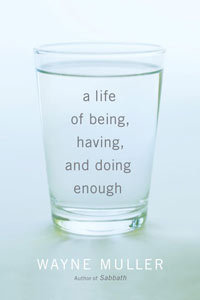Sufficiency
June 10, 2010 7 CommentsThere’s something about the word and notion of “sufficiency” that I love. Years ago, while living in France, I learned to enjoy the way the words “ça suffit” roll off the tongue. The term and idea resurfaced for me recently when I learned about the Third Annual Global Sufficiency Summit that was held here in Cambridge, MA in April. It has come up again while reading the newest book by Wayne Muller, whose writings were a helpful guide to me during my time in graduate school. Muller’s A Life of Being, Having, and Doing Enough focuses squarely on the question of how we go about determining what is sufficient in different areas of our lives. He suggests that our failure to consider or know how to address this question has contributed to putting us in individual and collective dire straits.
“We have forgotten what enough feels like,” Muller writes. And as we are constantly pandered to by endless purveyors of solutions for leading the good or right life, we can easily be led astray. The result can be a pursuit of more, more, more, fueled by an underlying and sinking feeling of just not measuring up. Whether we are talking about time, money, belongings, (Twitter) followers, (Facebook and good old fashioned) friends, love, acclaim, or accomplishment, the inability to determine what is enough for oneself, one’s organization, or community in any given moment (because it surely does change) can seemingly have far-ranging effects. I’m wondering how much of the chronic busy-ness and feelings of overwhelm in our sector and social change work in general are due to the loss of our inner determiner of what is sufficient and to not consciously engaging in conversation with others about this.
The following passage from the book has become a focus of ongoing reflection for me:
“Enough, then, is a verb, a conversation, a fugue, a collaboration. It is not a static state, something achieved or accomplished. It is relational, by nature unpredictable, punctuated by wonder, surprise, and awe. It may feel dangerous and inefficient. It demands we stay awake, pay attention to what is true in this moment, in our hearts, and make our choices always and only from that place.”
What is clear to me is that being able to gracefully dance with the question “How much is enough?” is critical to my health, my contributions as a consultant, colleague, citizen, neighbor, friend, husband, father, brother and son, and to my deepest sense of contentment and contribution. And I wonder how this question sits with others. How have you gone about determining sufficiency in your life, leadership, and change work and why and how does this matter?

7 Comments
Thanks for inviting this powerful reflection Curtis. I’m not sure I can answer your question fully, as I know I often catch myself seeking more of something, most often an intangible something. I can say that to the extent I experience sufficiency it usually comes with an awareness or expression of gratitude. There is something appreciative about this path.
Gibran, I wonder what it means (or if it is meaningful) to seek more of what is enough? I’ve also been thinking of what Cynthia refers to as “the simplicity the other side of complexity,” meaning we must what through one to meaningfully arrive at the other. Perhaps this is true of sufficiency, that we must walk through the valley of feeling insufficient and pursuing more than we need to arrive at that point of what know is enough, or know better how to determine what is enough. To me this is a critical piece of our evolution!
Quickest way to living within sufficient means? Make everyone poor.
. . . or rich in other ways.
I applaud your powerful words Curtis. There is now an entire global community invested in the inquiry of enough – Global Sufficiency Network http://www.globalsufficiency.org. Check out the video’s articles, blogs and resources on the site.
There is no real access to true abundance from the context of scarcity – only chasing for more only to get it and be left wanting. But from the space of enough – true abundance is the way you experience life – present to all that you have and all that you are – grateful and generous.
Thank you, Marilyn. I look forward to learning more from you about the movement.
Hi Curtis,
So exciting to know you’re interested in this conversation. let’s talk. I have been involved with the Global Sufficiency movement Summit and the GSN for over 3.5 years now and I love knowing that you at IISC is intimately thinking about all this. How about a webinar for IISC clients on integrating Sufficiency into organizational leadership and practices. let’s talk.
Madeline McNeely